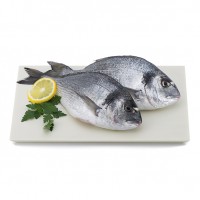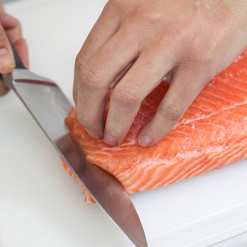

A pescetarian is a person who is a vegetarian but includes seafood in their diet. It still cuts out poultry, pork, and red meat, but does not cut out fish. There are many different reasons to switch to a pascetarian diet. According to the New York Times, meat consumption has doubled over the past 50 years in the United States. It is no coincidence that obesity, stroke, heart disease, and cancer have increased during the same time period. Pescetarianism can drastically improve your health. It reduces your risk for heart disease and other cardiovascular diseases. Up to 80% of cancer cases are preventable through a healthy diet that contains high amounts of fiber and low amounts of fats and oils, which is exactly what a pescetarian diet offers. Meat is usually covered in chemicals and pesticides that are harmful and can be dangerous to humans. Humans are able to get all of the iron they need from whole grains, fruits and vegetables, and fish, while you can get all the protein you need from plant sources, tofu, and legumes. Becoming a pescetarian also benefits the planet. According to the Vegetarian Resource Group, one pound of beef requires 2,500 gallons of water while a pound of wheat requires only 25 gallons of water. The space required to house livestock also results in a significant amount of deforestation. In the United States alone, more than 260 million acres of forest have been cleared to for the purpose of livestock. If you are against animal cruelty, becoming a pescetarian is one way you can protest. Most farm animals are subjected to terrible living conditions and are removed from their natural habitats. Chickens are usually kept in tiny wire cages and have their beaks removed to prevent them from pecking each other. If you can make your diet healthier while also protesting animal cruelty, why wouldn’t you make the switch?
 A pescetarian diet isn’t right for everybody, however, and you need to really think about the pros and cons before you make a change to your diet. First, you need to consider other people in your life. If you have a spouse or a family, you need to think about how your dietary changes will affect them. If you eat meals as a family, you may need to cook your own food separately before making their food. This can add a lot of time to your meal preparation because you are essentially making two meals. You may also need to add supplements to your diet to make up for some of the nutrients you are lacking. Pescetarian’s also need to like fish. If you do not like fish, this diet is not for you. If your partner or another family member is allergic to fish or seafood, a pescetarian diet may be a poor decision. If you are still set on cutting out meat, you may want to try a vegetarian diet or a vegan diet instead. You also need to make sure you are eating properly to gain the full health benefits. A pescetarian can still eat chips, cookies, and cake. Cutting out meat alone won’t be enough in ensuring you are living a healthy lifestyle.
A pescetarian diet isn’t right for everybody, however, and you need to really think about the pros and cons before you make a change to your diet. First, you need to consider other people in your life. If you have a spouse or a family, you need to think about how your dietary changes will affect them. If you eat meals as a family, you may need to cook your own food separately before making their food. This can add a lot of time to your meal preparation because you are essentially making two meals. You may also need to add supplements to your diet to make up for some of the nutrients you are lacking. Pescetarian’s also need to like fish. If you do not like fish, this diet is not for you. If your partner or another family member is allergic to fish or seafood, a pescetarian diet may be a poor decision. If you are still set on cutting out meat, you may want to try a vegetarian diet or a vegan diet instead. You also need to make sure you are eating properly to gain the full health benefits. A pescetarian can still eat chips, cookies, and cake. Cutting out meat alone won’t be enough in ensuring you are living a healthy lifestyle.
